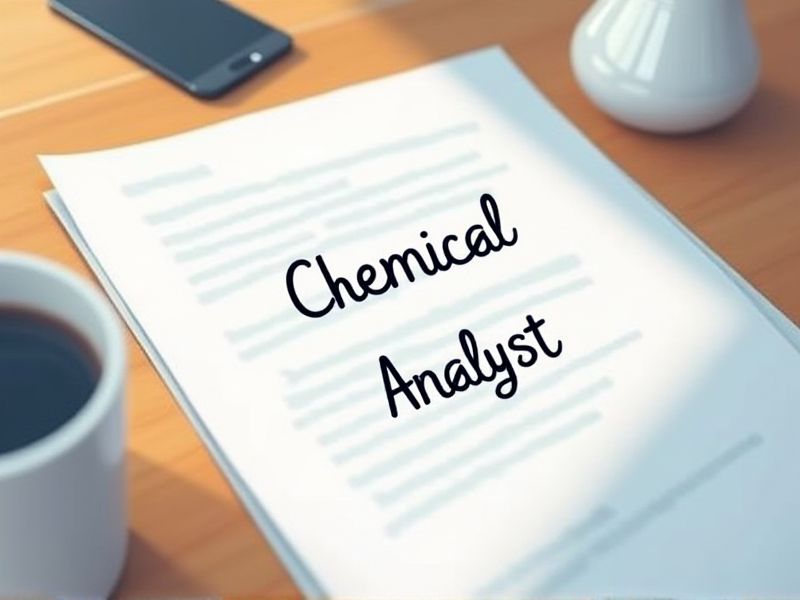
Chemical analysts operate in environments where precision is crucial, affecting product quality and safety. Having specific certifications indicates mastery of skills like chemical handling, data interpretation, and instrumentation usage. These credentials enhance credibility and ensure compliance with industry regulations and standards. Key certifications for a chemical analyst might include the Certified Chemical Technician (CCT) and Hazardous Waste Operations and Emergency Response (HAZWOPER).
Certified Chemical Analyst (CCA)
Certified Chemical Analysts (CCAs) bring verified expertise and knowledge, ensuring accurate and reliable chemical analysis. Their certification signifies adherence to industry standards and best practices, reducing the risk of errors and enhancing data credibility. CCAs undergo rigorous training, equipping them with the skills to handle complex analytical instruments and methodologies. Their role is crucial in maintaining safety and compliance with regulatory requirements in chemical analysis processes.
Certified Laboratory Technician (CLT)
Certified Laboratory Technicians (CLTs) possess specialized skills that are necessary for ensuring accurate chemical analysis, as their training emphasizes precision and adherence to standardized procedures. Their certification demonstrates proficiency in handling complex equipment and understanding the intricacies of lab protocols, which reduces the possibility of errors during chemical experiments. The presence of a CLT in a lab setting streamlines processes, enabling Chemical Analysts to focus on interpreting results rather than routine maintenance tasks. With their expertise in safety regulations and best practices, CLTs play a crucial role in maintaining a safe working environment, which is essential for the integrity of analytical results.
Good Laboratory Practice (GLP) Certification
GLP certification ensures the reliability and credibility of data generated by chemical analysts, which is crucial for regulatory compliance. It enforces standardized procedures, minimizing errors and variations in testing processes. Certification enhances safety protocols, protecting both analysts and the environment from potential hazards. Accredited laboratories gain trust from clients and stakeholders, increasing business opportunities and industry reputation.
ISO/IEC 17025 Training Certification
ISO/IEC 17025 Training Certification ensures that chemical analysts adhere to international standards for testing and calibration, guaranteeing accuracy in their results. With this certification, laboratories can prove their competence, which helps to establish trust with clients and regulators. Certified analysts are better equipped to manage laboratory operations efficiently, reducing errors and maintaining consistency. Comprehensive training also enhances analysts' understanding of quality management systems, leading to improved overall performance and laboratory accreditation readiness.
Hazardous Materials (HAZMAT) Certification
Hazardous Materials (HAZMAT) Certification is needed for Chemical Analysts as it ensures they are knowledgeable about safely handling and disposing of dangerous chemicals. This certification reduces the risk of accidents and exposure to toxic substances in the workplace, thereby safeguarding personal health and that of colleagues. It grants analysts the legal compliance needed to work with regulated materials, avoiding potential fines or legal consequences for mishandling. Companies employing certified professionals can enhance their safety protocols and uphold industry standards, thereby boosting their operational credibility.
OSHA Laboratory Safety Certification
The OSHA Laboratory Safety Certification ensures chemical analysts understand and adhere to federal safety regulations, minimizing hazardous incidents. Proper certification reduces workplace accidents, which, in turn, leads to fewer injuries and associated costs. With comprehensive safety training, labs maintain compliance, avoiding potential legal penalties and reputational harm. Certified analysts contribute to a safer work environment, enhancing overall productivity and job satisfaction.
Chemical Hygiene Officer (CHO) Certification
Chemical Hygiene Officer (CHO) Certification is essential because it ensures a chemical analyst possesses a comprehensive understanding of laboratory safety protocols and regulations. This qualification mitigates the risk of hazardous chemical exposure by implementing effective safety practices, thus protecting personnel and the environment. Holding the certification signifies credibility and competency, enhancing job prospects and career advancement for chemical analysts. Certification aligns with legal and organizational standards, ensuring compliance in the handling and disposal of chemical substances.
Environmental Monitoring Certification
Environmental Monitoring Certification equips chemical analysts with the necessary skills to assess and mitigate the impact of chemicals on ecosystems. The certification ensures adherence to legal and regulatory standards, reducing the risk of non-compliance penalties. With certified knowledge, chemical analysts can more effectively identify and address potential environmental hazards. This expertise enhances the credibility and trustworthiness of the analysts in the industry.
Advanced Analytical Chemistry Certification
Advanced Analytical Chemistry Certification equips chemical analysts with specialized knowledge in advanced techniques, enhancing their ability to accurately interpret complex data. This certification is often required by employers seeking analysts capable of handling sophisticated laboratory instruments and methodologies. Analysts with this certification are more competitive in the job market, as it signals a commitment to ongoing professional development. Having the certification may lead to more opportunities for career advancement and higher salary potential.
Process Safety Management (PSM) Certification
Process Safety Management (PSM) Certification is necessary for a Chemical Analyst because it enhances their understanding of critical safety protocols in handling hazardous substances. This certification helps in reducing the risk of chemical accidents, ensuring a safer work environment. The knowledge gained through PSM is crucial for compliance with industry regulations and standards. It also improves the analyst's ability to develop and implement effective safety measures within chemical processes.
Summary
When you obtain certifications as a Chemical Analyst, you enhance your professional credibility and marketability. This often leads to increased job opportunities and the potential for higher salaries. Employers tend to favor certified professionals due to their validated skills and knowledge. These certifications can also enable access to advanced positions and specialized projects within the industry.
